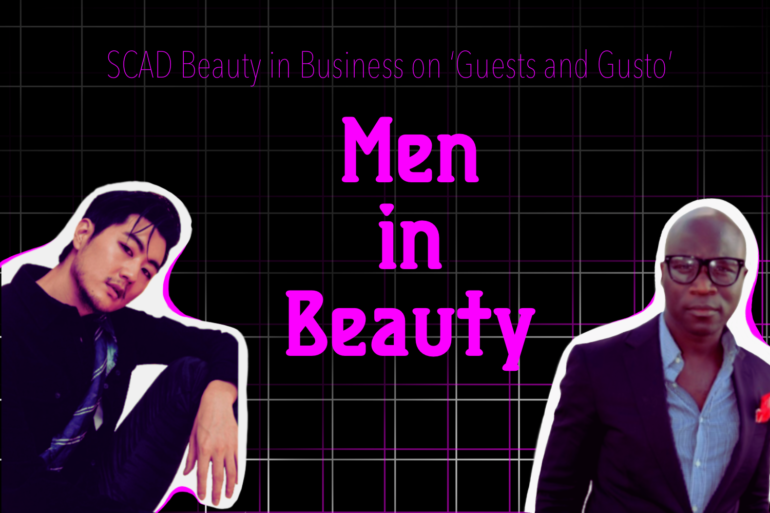On Wednesday, September 29th, SCAD held a Beauty Summit that spanned many important conversations about the beauty industry. A recurring theme was Men in Beauty. Many influential men from differing sides of the industry were interviewed and had insightful opinions about where men fit in beauty.
The first conversation of the Summit was between David Yi, co-founder of Very Good Light, author of Pretty Boys, and business of beauty and fragrance professor and Associate chair, Meloney Moore. Yi brought up a fascinating point about why the history of beauty included men putting care into themselves and their skin. However, in the 21st-century, men have been reduced to dove bar soap and three in one soap. Beauty has often been quite different between the east and the west, with the east focusing on ingredients and caring for yourself no matter your gender. In contrast, the west has been more concerned with constructing harsh “guidelines” for masculinity. Yi discussed how in his own life he follows the Confucius idea to put your best foot forward.
A strong point made by many panelists was about the blending of gender in the beauty industry. However, this blending of gender within trends and brands still needs work. There have been significant steps towards equalizing beauty for all. However, gendered rules still cast a negative light on the beauty industry. Yi brought up the influence male celebrities have on how beauty is perceived. The celebrities talked about by the panelists were Bad Bunny, Machine Gun Kelly (MGK), BTS, and Harry Styles. These are all male celebrities who have started to help blur the lines of masculinity and beauty, with Bad Bunny and MGK wearing fun, colorful nails, and BTS and Harry Styles wearing makeup as a way of expression.
Later at the Summit, fashion marketing, and management professor Steven White had a conversation with four men in the beauty industry about moving past the gender binary. Within this conversation, Troy Alexander, founder, and CEO of TROY Skincare for men, named his mom as his inspiration for entering the beauty industry, as she introduced him to the world of grooming. An important note from this panel was how they had a woman in their life who introduced them to skincare, makeup, fragrance, or grooming for most of the men. This is important to note as often shame has been involved with masculinity making the beauty industry seem as if it is only available for women.
The panelist discussed the idea of what masculinity is. Dexter King, Senior VP GM of international and global strategy at Tom Ford Beauty, shared his unique and insightful perspective that masculinity changes based on where you are standing. This can be connected to culture, family, what country you are from, and many other contributing factors. Dexter’s idea relates well to David Yi’s discussion about the differences in masculinity between the eastern and western worlds. Angel Merino, the content creator, and CEO of Artist Couture, shared how his view of masculinity ten years ago was an image that was often changing.
In contrast, today, the notion of masculinity has been extremely rigid to him. Merino told the panel that straight men might never find the world of beauty unless they are introduced to it by a loved one because of this rigidity. SCAD graduate Greg Tackett, digital manager of global marketing at Ralph Lauren Fragrances, added to this and brought up Baseball star A-Rod being the face of Hims new line of concealer. Without a famous face known for his athleticism and fitting society’s idea of masculinity, men may never know about this product and may never buy it.
These were wonderful conversations to have the opportunity to witness, men have often been lacking from the beauty industry, and those apart of the industry have not often got their voices heard. All people deserve to feel good and look good. Having people like the five panelists in the beauty industry marks a promising direction for the future of gender and beauty. Although it is easy to note the negative things are happening within the industry, good steps are still being made. Brands that have helped blur the lines are CeraVe, The Ordinary, Amorepacific, Innisfree, and Laneige.
The hopes are high for the positive forward movements of the beauty industry. The addition of more people of differing backgrounds and younger generations into the industry will hopefully help make strides. What the industry will look like in 10 years is unknown right now; however, as individuals, we can help shape the industry by the products we buy, who we buy from, as well as the positivity and kindness we spread to everyone.
Words by Annika Petersen.
Graphic by Shreya Dhar.

